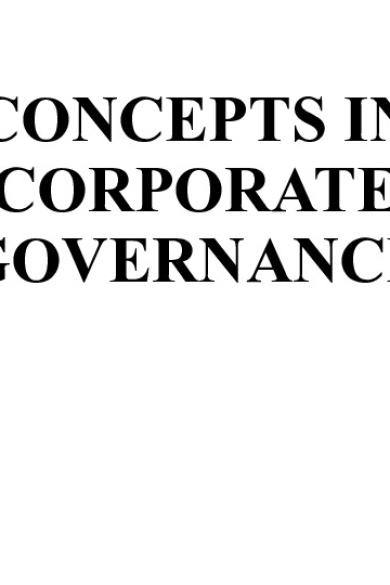* The preview only shows a few pages of manuals at random. You can get the complete content by filling out the form below.
Description
CONCEPTS IN CORPORATE GOVERNANCE
COMMON CONCEPTS FOR SOUND CG • Concepts that apply to sound CG in countries where international investors invest their money. - Openness, Honesty and Transparency; - Independence - Accountability - Responsibility - Fairness - Reputation, and reputation risk; - Social responsibility.
OPENNESS, HONESTY AND TRANSPARENCY • Openness means a willingness to provide information to individuals and groups about the company. • Information is given without giving away commercially sensitive information. • It might be useful to think of openness in terms of its opposite; which is to be a “closed book” and refuse to divulge any information whatsoever. • Shareholders and investors need to know what/about the position of the company is. • Therefore, stakeholders will benefit from timely information about developments in the company perhaps through web-site etc.
OPENNESS, HONESTY AND TRANSPARENCY • Honesty might seem an obvious quality for companies. • In the contemporary business world, honest information is by no means as prevalent as it should be. • A sign of honesty is that a company’s statement is believed. • A sign of questionable honesty is some measure of skepticism and disbelief. • A test of a company’s apparent honesty can be checked by looking out for reports and announcements and check the Press comments and reactions to the announcement.
OPENNESS, HONESTY AND TRANSPARENCY Transparency: Means visibility. • In the context of CG, transparency refers to outcomes that are reached or decisions that are made as a result of clear and visible procedures and processes. • In the context of company reporting, it refers to information that makes clear the position and performance of the company. • And the way in which information has been derived.
OPENNESS, HONESTY AND TRANSPARENCY • Transparency refers to the ease with which an outsider is able to make a meaningful analysis of a company and its actions. • Transparency refers to both information about the financial position of the company and to non-financial issues e.g. strategic direction etc. • Transparency also refers to a lack of clarity about the way that decisions are reached or process carried out. • A transparent company is whose information investors understand and believe and therefore the necessary trust between investors and the company should be established. • Contrast a company that reaches its major decisions through a clear process and one that reaches its decisions “behind closed doors,” and in “smoke filled rooms.”
INDEPENDENCE Independence: Means free from influence of another individual(s) and free from conflict of interest. • Independence refers to the extent to which procedures and structures are in place so as to minimize/avoid potential conflict of interest • An example is the domination of a company by an all-powerful company chairperson and/or CEO or a major shareholder.
ACCOUNTABILITY Accountability: Means the requirement for a person in a position of responsibility to justify, exercise, or account for the exercise of his/her performance or actions. • Accountability is to the person(s) from whom the authority is derived. • Individuals who make decisions on behalf of the company should be held accountable for decisions and actions they take. • Shareholders should be to assess the actions of their board of directors and board committees, and have the opportunity to query them.
RESPONSIBILITY Responsibility: Means having authority over something, and so liable to be held accountable for the exercise of that authority. • An issue in CG is whether directors should be liable for their performance to stakeholders, and their shareholders in particular. • For example, should shareholders have the right to re-elect all board of directors each year?
FAIRNESS Fairness: Means impartiality, a lack of bias. • In the context of CG, the quality of fairness refers to things that are done or decided in a reasonable manner, and with a sense of justice, and avoid bias. • Fairness refers to the principle that all shareholders should receive equal consideration • For example, Minority shareholders should be treated in the same way as the Majority shareholders. • In most countries, rights of Minority shareholders are disregarded by larger shareholders and the board of directors.
REPUTATION AND REPUTATION RISK Reputation: Means the character generally ascribed to the entity. • A reputation maybe good or bad, and maybe an asset or hindrance. • A good reputation needs to be built up over many years and encompasses many facets of business activity. • Reputation will reflect the overall way in which a company is perceived by the markets and in the wider community • For listed companies, a good reputation is a key asset. • Damage to a company’s reputation is very quickly reflected by a drop in it’s share price. • Damage to a company’s reputation can be overnight and maybe due to a badly handled catastrophe or just bad publicity.
ETHICS • Personal and business ethics underlie all the regulations and codification in corporate governance. • Laws and regulations alone can never guarantee fair practice. • Ethical conduct is behavior that is in accordance with a written or unwritten code of ethics and set of moral values. • In the context of CG, ethical conduct applies to individuals and also to organizations. • Code of ethics is a comprehensive set of rules or guidelines for moral behavior; rules of conduct recognized as appropriate.
CORPORATE SOCIAL RESPONSIBILITY (CSR) • There is no single, commonly accepted definition of CSR. • CSR - means responsibility shown by a company for matters of general concern to the society in which it operates. • CSR – means business decision making linked to ethical values, compliance with legal requirements, and respect for people, communities and the environment. • There is a view that the best-managed companies are those that are aware of their responsibilities towards all stakeholders and society as a whole.
WHISTLEBLOWING Whistleblower: An individual, usually an employee, who reports concerns about misconduct/misdemeanours by someone in an organization. • A whistleblower is an employee who provides information about his or her company which he or she reasonably believes provides evidence of: - A violation of a law or regulation by the company; - A miscarriage of justice; - Financial malpractice; - A danger to public health or safety.
WHISTLEBLOWING • A whistleblower does not use normal lines of reporting, but instead goes to a senior individual within the organization or to someone outside the organization, such as the Press or a regulatory body. • A feature of whistleblowing is that the individual concerned has been unable to get a response from the company’s management through normal lines of reporting, which has forced them to go to someone else with the information. • Whistleblowing can be malicious as well as honest.
END













